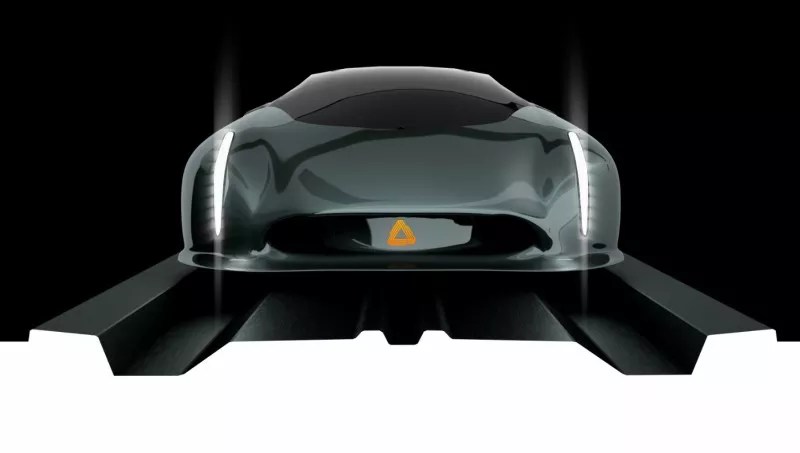

Audio By Carbonatix
Today, November 14, two months to the day since Hyperloop One named the Rocky Mountain Hyperloop proposal a winner of its Global Challenge to “identify the strongest new Hyperloop routes in the world,” the Colorado Department of Transportation is announcing that Arrivo, a hyperloop-like transportation system, has agreed to build a test track in the Denver metro area. The location will be revealed at a press conference this morning. The details are below.
CDOT is already engaged in a public-private partnership with Hyperloop One related to a feasibility study. But Shailen Bhatt, the department’s executive director, stresses that the Arrivo pact won’t come as a shock to the Hyperloop-One brain trust.
The new partnership “was a completely independent decision,” Bhatt says, “but we’ve been in constant contact with the Hyperloop One folks. We always want to be very transparent. We’re agnostic about who and how we move transportation forward in Colorado. All we care about is saving lives and making people’s lives better. But as soon as the Arrivo folks reached out to us, we wanted to let the Hyperloop One folks know that there was another company looking for a public-private partnership to help us achieve our mission.”
Arrivo isn’t affiliated with Hyperloop One, but Bhatt points out that “they use similar magnetic-levitation technology. I think the easiest way to distinguish between the two is that Hyperloop One uses a vacuum tube and can go 600 miles per hour. That’s why we’re talking about routes from Cheyenne to Durango or to Houston via Denver — because 600 miles per hour is very comparable with air travel.”
In contrast, Bhatt goes on, “Arrivo has no vacuum component, so it’s not going to go 600 miles per hour. It might go 300 miles per hour. But the key difference is that you can drive a vehicle onto Arrivo’s vehicle. You can drive a car or truck onto it, and then the magnetic-levitation vehicles goes on an open roadway. It’s not covered up; it’s open to the air. It’s not sealed.”

An illustration simulating transportation of vehicles and freight on Arrivo.
By making this decision, Arrivo engineers “gave up some speed,” Bhatt acknowledges. However, they also avoided one of the issues most frequently mentioned by Hyperloop One critics — that a single bullet fired into the vacuum tube would cause the system to shut down or worse.
There’s certainly debate about how bad the worst-case scenario would be in this case. “I asked the Hyperloop One chief engineer about catastrophic loss of pressure,” Bhatt says. “The way he explained it was that it wouldn’t be like when you’re in space and everybody just disintegrates into goo. The vehicle would just lose its vacuum, slow down, go to the next station and stop.”
With Arrivo, though, “there is no vacuum. It’s open air, so there’s nothing to pierce. There wouldn’t be any issues with the vacuum, since there’s no vacuum to lose.”
Because the Arrivo system will theoretically travel at half the speed of Hyperloop One, Bhatt sees it as an “intra-regional solution,” as opposed to “more of an interstate or inter-regional one.” But there are plenty of possible applications.
According to Bhatt, “one of the things that made Arrivo interested in Colorado was Denver International Airport. We have the fifth-busiest international airport in the country, and some folks have been talking about using Arrivo to go from the airport to downtown in ten minutes. And I’m particularly interested in the freight component. Say I can pull trucks off Interstate 25, which is a major north-south freight corridor, well south of Denver metro, put them on this type of system and shoot them around, almost like a bypass. Then we could drop them off up north, and they would never get into downtown Denver. And if I can take large numbers of trucks out of Denver metro, that would be a huge win for us.”

Another image from the Arrivo website.
How much will the partnership cost Colorado in the short run? Bhatt doesn’t know the amount that the Colorado Office of Economic Development and International Trade (OEDIT) offered in incentives to lure Arrivo, which expects to have what he estimates as “a couple of hundred engineers working here by 2020.” But the outlay from CDOT is modest — somewhere between an additional $20,000 to $50,000 that may be folded into the pre-existing Hyperloop One feasibility study.
As for a time frame, Bhatt says, Arrivo would like to break ground on its test track early in 2018 and “have commercial service going somewhere in five years.” There’s been no commitment to place one of the first routes in Colorado thus far, but Bhatt thinks it would make sense, given that so much of the operation would be located in the state.
In the meantime, Bhatt is pleased by Colorado’s growing reputation as a transportation innovator.
“Everybody’s talking about Denver as a contender for the second Amazon headquarters,” he notes. “Well, I think that all the cities that are competing for that are trying to win the 21st century — and the cities that are going to do that are the ones that are open to new ideas and new technologies. We have a pretty significant transportation challenge in Colorado, and there is no shortage of twentieth-century ideas about widening roads and widening highways. And some of that is needed. But we’re not going to solve our problems by widening every road. We have to look at new technologies. And that’s what we’re doing.”
The aforementioned press conference will take place at 11 a.m. today, November 14, at E-470 headquarters, 22470 East Sixth Parkway in Aurora. Participants will include Bhatt, Arrivo co-founder Brogan BamBrogan, E-470 director of technology Sandy Bish, and OEDIT communications manager Emily Williams. We’ll update information about the test-track location in this space.